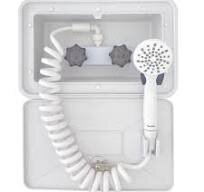Good Morning and I’m glad to be here. I have a little experience RV’ing but as a kid in a Class A in the late 80’s to mid 90’s. A lot of things are coming back to my remembrance.
Last night I figured that as long as I’m hooked up to house water my gas and electric water heater will run hot for just a second and then turn cold. But when I turn off the water to the house going to the RV the water is hot. I have an idea of why but I wanted to get some more opinions on the matter or if anyone else has experienced this before. Thanks.
Last night I figured that as long as I’m hooked up to house water my gas and electric water heater will run hot for just a second and then turn cold. But when I turn off the water to the house going to the RV the water is hot. I have an idea of why but I wanted to get some more opinions on the matter or if anyone else has experienced this before. Thanks.


